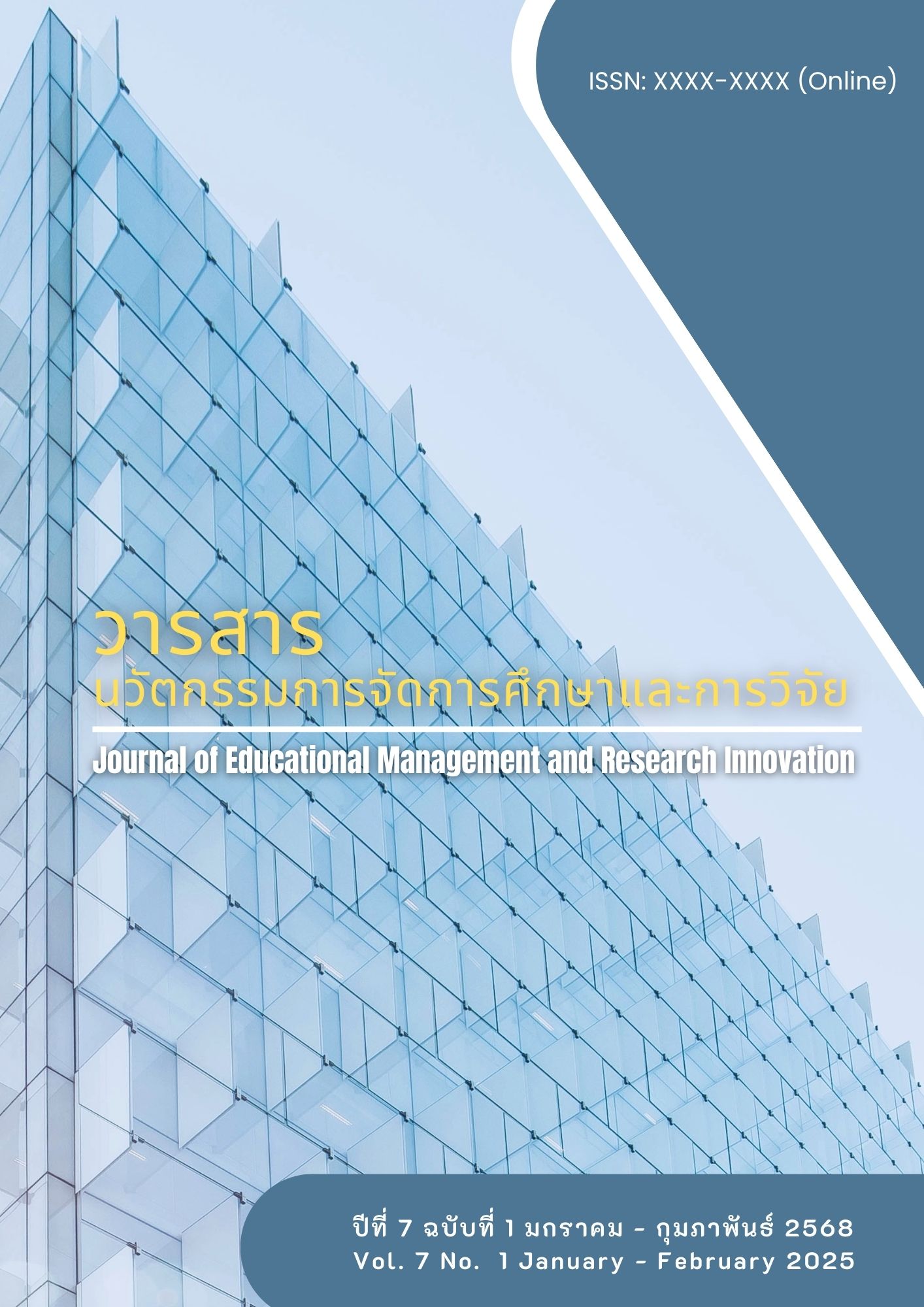A Synthesis of Buddhist Principles based on King’s Philosophy towards Sufficiency Agricultural Learning for Community Self-Reliance
Main Article Content
บทคัดย่อ
The objectives of this research were to study the principles of Buddhism based on King’s Philosophy towards Sufficiency Agricultural learning for community self-reliance; to synthesize the principles of Buddhism based on King’s Philosophy towards Sufficiency Agricultural Learning for community self-reliance; and to propose guidelines integrate Buddhist principles based on King’s Philosophy towards Sufficiency Agricultural Learning for community self-reliance.This Action Research following PAOR process was used for the designs. The research process divided into 4 steps, consisted of the planning stage (Plan: P) to develop an experimental area for land management with royal science integrated into Kok Nong Na R-Model in areas outside the irrigation area, practical steps (Act: A) in developing experimental areas according to the plan and extracting lessons from land management with integrated royal science to Kok Nong Na R-Model in community self-reliance according to Sufficiency Agriculture Method, Observation Stage (Observe: O) by observing the results that arise from following up on the practical work and the reflection stage (Reflect: R) from what happened after the creation of the community network, a case study of land management according to the royal initiative of the King Rama IX, integrated towards Kok Nong Na R-Model in community self-reliance according to Sufficiency Agriculture method. A synthesis of Buddhist principles based on King’s Philosophy towards sufficiency agricultural learning for community self-reliance is to synthesize the core principle of Buddhist principles which have applied in the developed area of Kok (forest), Nong (swamp), and Na (field) in the using the process of action research (PAOR) to conduct and generate to be the results as above
Article Details

อนุญาตภายใต้เงื่อนไข Creative Commons Attribution-NonCommercial-NoDerivatives 4.0 International License.
เอกสารอ้างอิง
Agricultural Information Center Office of Agricultural Economics Ministry of Agriculture and Cooperatives. (2020). Annual Report: Agricultural Economic Indicators of Thailand 2019. Bangkok: Agricultural Information Center Office of Agricultural Economics Ministry of Agriculture and Cooperatives.
Chaichok, N., & Kasorn, K. (2023). Potential Enhancing Lanna’s Food Productive based on Cultural Capital to Career and Income of Sustainability Community. Journal of Multidisciplinary in Humanities and Social Sciences, 6(2), 681–697.
Chutithammo, P. D., Chitsaitharn, N., & Sapsin, J. (2020). The Role of the Subdistrict Municipality in Promoting Living According to the Philosophy of sufficiency economy in the community of the subdistrict municipality in Phlapphlachai District Buriram Province. Journal of Local Governance and Innovation, 4 (1),143-156.
Dhammahaso, P. H., Pimnon, P. A., Sakabucha, S., & Phophichit, N. (2022). Concept of “Khok Nong Na Model” for Sustainable Development. Journal of Arts Management, 6(1), 419–434.
Horsaengchai, K. (2022). An Introduction to an Integrated Model of Ecological Farming and Sustainable Development by Buddhist Peaceful Means: A Case Study of Khok Nong Na Model, Prang Ku, Sisaket. Journal of the Philosophy and Religion Society of Thailand, 17(1), 74-90.
Mahachulalongkornrajavidyalaya University. (1996). Thai Tipitaka. Bangkok: MCU Press.
Monaraks, V., Dhammahaso, P. H., & Vadakovito, P. P. (2020). Sustainable Community Enterprise Development by Buddhist Peaceful Means: A case study of Sawai community, Prang Ku District, Sisaket. Journal of MCU Peace Studies, 8(5), 1721–1735.
Moontha, P. T., Taweesuk, S., & Phrachayanunthamunee. (2023). Geo-Information Technology for Environmental Management of Buddhist Temples Accoding to Sappaya in Mueng Nan and Phu Phiang Districts, Nan Province. Journal of International Buddhist Studies, 14(1), 21–42.
Phansawang, J., Phrakrukittiwarathorn, Silarat, P., Linthamart, S., Phansawang, A., Hansopa, R. (2020). A Model for living a Self-Reliance Way of life Based on the Buddhist Principle of Right Livelihood to Develop the Quality life of the Farmers in the Central Northeastern Region. Academic Journal of Mahamakut Buddhist University Roi Et Campus, 9(1), 84-94.
Phra Brahmagunabhorn (P.A. Payutto). (2011). Dictionary of Buddhism. (17th ed.). Bangkok: Dhammasapa.
Promphenrangsi, R., & Taeporamaysamai, P. (2024). The Impact of Participatory Development on Local Economic Development: The Case Study of E-San Gastronomy in Sakon Nakhon Province, Thailand. Journal of Multidisciplinary in Humanities and Social Sciences, 7(3), 1342–1369.
Sangkanjanavanich, W. (2023). Holistic Development of the Quality of Life According to Sufficiency Economy Philosophy. Journal of Multidisciplinary in Humanities and Social Sciences, 6(5), 2388–2401.
Sernvongsat, P. (2023). The King’s Philosophy and Local Development in the 21st Century. Academic Journal of Political Science and Public Administration, 5(1), 1–12.
Simpa, P. P. (2024). The Learning Process of Imagineering Integrates the Threefold Training. Journal of Educational Management and Research Innovation, 6(1), 269–278.
Tahom, U., Dhurata, S., & Wongsa, K. (2019). Participatory Farmer Potential Development by Applying the Principles of Sustainable Agriculture to Reduce Production Costs for Farmers Ban Khu Khat Community, Satuek Subdistrict, Satuek District, Buriram Province. Journal of Social Development, 21(2) 1-27.


